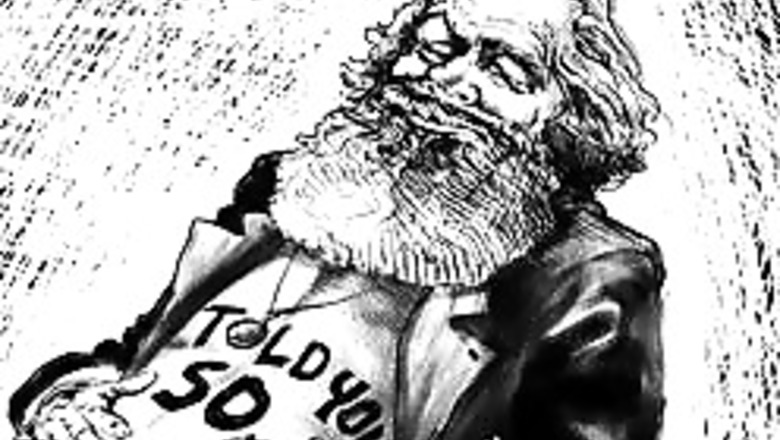
views
Washington: Capitalism as we used to know it is on its deathbed. And those who predicted that the old brand, the unfettered, American-promoted system, was a danger to the world, are being vindicated.
They include Karl Marx, whose thinking on banks seems oddly contemporary these days. The credit crisis that began in August last year and turned into near-catastrophe this month is not over, despite the hundreds of billions of dollars that governments are spending to save banks in the United States and Europe from collapse and thereby prevent a global depression.
But there is an emerging consensus that capitalism needs a 21st century overhaul, not just emergency rescues, to save it from itself. When that will happen is not clear.
"What we are seeing right now looks like a very slow train wreck," says James Boughton, the historian of the International Monetary Fund (IMF).
British Prime Minister Gordon Brown has suggested an international meeting on the pattern of the 1944 Bretton Woods conference that resulted in the post-World War II financial order and created the IMF and the World Bank. That system was dominated by Washington.
The United States, from where the credit crisis spread like a virulent epidemic, is not likely to play as large a role in whatever new "financial architecture" world leaders construct.
As Peer Steinbrueck, the German finance minister, put it: "One thing seems probable ... The U.S. will lose its status as the superpower of the global financial system."
"The world is at risk of losing its anchor ... the United States," U.S. financial strategist David Smick writes in his just-published book on financial globalisation, The World is Curved: Hidden Dangers to the World Economy.
The opening chapter is darkly entitled ‘The End of the World’. Smick said in an interview he thought a global depression was still possible despite the steps taken by the United States and Europe to restore confidence.
PAGE_BREAK
Those measures included buying stakes in major banks—in effect partial nationalisation—and would make Marx smile if he could rise from his grave.
End of Marxism
In the Communist Manifesto he and his collaborator Friedrich Engels published in 1848, Marx listed government control of capital as one of the ten essential steps on the road to communism. Step five: "Centralization of credit in the hands of the state ..."
There are not many Marxists left in the industrialised world and not even the most fervent expect the revival of an ideology that failed so dismally in the Soviet Union.
But as far as the United States is concerned, the events of the past few weeks represent a momentous break with decades of a free market philosophy that abhorred government intervention in (and regulation of) financial markets.
"There is little question that making the government a major investor in American banks raises thorny questions ... about the role of the public sector in private markets," wrote Senator Charles Schumer, a member of the Senate finance and banking committees, wrote in the Wall Street Journal the day the government announced it was planning to take equity stakes worth up to $250 billion in American banks.
It will take time for questions about the public sector in private markets to be answered. But it looks likely that some things will never be quite the same, no matter who wins the presidential election on November 4.
For one, the control centre of the financial market has already begun shifting from New York to Washington. The "big government" that free marketeers identified as something evil is almost certain to make a comeback, although spending on America's crumbling infrastructure, its inefficient health care system, and environmental programs will be limited by the Everest-sized public debt.
The US national debt has increased by an average of $3.34 billion a day over the past year and now stands at more than $10 trillion. Both in the United States and in Europe, officials have stressed that government intervention in the banks will be temporary but whether they will be able to stuff that genie back into the bottle remains to be seen.
PAGE_BREAK
And "temporary" has not been defined. "We will not stand down until we have achieved our goal of repairing and reforming our financial system and thereby restoring prosperity to our economy," said Ben Bernanke, the chairman of the Federal Reserve.
Amid the gloom and anxiety of the worst financial crisis since the Great Depression, which started in the United States in 1929 and then spread to the rest of the world, there are hopes that Capitalism 2.0 (if it ever comes about) will result in a more equal society.
"There is a tremendous opportunity now to narrow the income gap," says Sam Pizzigati of the Institute for Policy Studies, a Washington think tank. That gap resembles the top-to-bottom income distribution just before the Great Depression, according to the Washington Center on Budget and Policy Priorities.
Then as now, the top 1 percent of households accounted for around one fifth of the national income. In 1980, their share was 8 percent. History shows that deep financial crises have helped spur public policy reforms and those pending include legislation that would make it easier for American workers to join labour unions.
At present, 7.5 per cent of private sector workers are union members, the lowest percentage in the industrialised world. U.S. unions say they are close to reaching a goal of collecting, by election day, one million signatures supporting the legislation. If passed, it would be part of what some have already started calling the new world financial order.
(Bernd Debusmann is a Reuters columnist. The opinions expressed are his own. You can contact the author at [email protected])


















Comments
0 comment